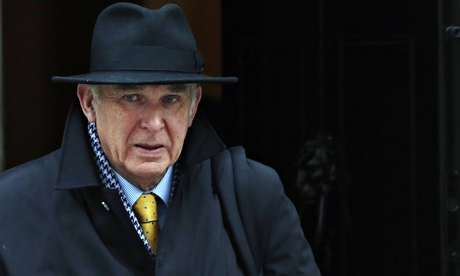Liberal Democrat concerns over the impact of the Help to Buy scheme have been intensified by new figures from the Office of Budget Responsibility showing house price inflation is continuing to soar.
The increase is likely to peak in the third quarter of this year at an annualised rate of 9.2%, the official forecaster said. That figure is substantially higher than the OBR was forecasting only four months ago, and means house prices are on course to reach pre-crash levels.
Business secretary Vince Cable has repeatedly questioned whether Help to Buy – which provides state support for people buying homes – is fuelling a property boom that could lead to an unsustainable recovery.
In a Commons debate on the budget, Ed Balls, the shadow chancellor, goaded Cable about his previous warnings over Help to Buy, claiming he had become enslaved in government and urging him to get out before it was too late.
Cable conceded it was "spot on" to say that a lack of productivity and investment in the economy was casting a very long shadow over the length of the recovery.
"All recoveries tend to start with consumer spending, but lack of investment is a deep-rooted problem in the United Kingdom," he told MPs.
His political allies have pointed to passages in the OBR report showing how house price inflation was worsening, saying: "This proves Vince was right and the Bank's financial policy committee needs to look at this." Tim Farron, the Liberal Democrats' president, warned: "Help to Buy threatens to stoke the London property market and pull the chance of home ownership away from thousands."
The OBR report said: "House prices have continued to accelerate since our December forecast with annual growth reaching 5.5 % in December 2013.
"We expect house prices to peak earlier than in our December forecast at 9.2% in the third quarter of 2014, with prices rising by around 30% by 2018-19.
"House prices will grow by 8.6% in 2014-15, 2.7% higher than forecasted in December."
It adds: "By the end of the forecast period [2018-19] house prices will be only 0.5 % below their pre-crisis peak".
At present the second part of the Help to Buy scheme – aimed at helping people buy any home, not just newbuild homes – is set to finish after December 2016.
The astonishing impact of rising house prices on government tax receipts is also spelt out in the OBR report.
It suggests ministers will recoup more than £70bn in stamp duty in the five years to 2018-19; the annual income is due to rise from £9.5bn in 2013-14 to £18.1bn in 2018-19. The figures also show that one in 10 estates will be liable for inheritance tax within five years, as opposed to the current figure of one in 20. London accounted for 40% of stamp duty income last year.
The OBR suggests the number of houses that will be taxed at 3% due to being valued at over £250,000 will rise sharply, saying it now expects that the average house price will exceed the 3% threshold for the first time this year.
Balls also told parliament that Labour would vote for the permanent welfare cap in the Commons next Wednesday, amid signs that the cap may not prove to be the budget political trap for Labour that Osborne intended.
Labour sources said they expected only a small number of its MPs would vote against the cap next week, and some shadow cabinet members even believe that backing it will help the party defend itself from the charge that is "soft on welfare". This relaxed stance is partly due to the Liberal Democrats' insistence that the cap should not be set too tightly.
Welfare payments – except the state pension and benefits linked to cyclical unemployment rates – will be not be able to exceed £119.5bn in 2015-16, Osborne announced. The cap is forecast to rise in line with inflation to £126.7bn in 2018-19.
Gavin Kelly, chief executive of thinktank the Resolution Foundation, said: "It's unclear how much difference the proposed cap would really make to the behaviour of a future government. If the government of the day wants to constrain welfare spending then it would be able to do that with or without the cap.
"Equally, if it wants to get out of the cap, in all likelihood it wouldn't be very hard to adjust it."
Kelly also questioned how the cap would function if universal credit, the government's new welfare benefit, becomes operationally nationwide.
He said: "One of the points in favour of universal credit is that it is supposed seamlessly to integrate in-work and out-of-work support, but the logic of the welfare cap points in the opposite direction.
"We are yet to hear from the government what the welfare cap might mean for the operation of universal credit."
As it stands, some part of universal credit linked to those who are out of work will remain outside the cap, but those parts of it paid to those in work will come inside it.
Any party wanting to breach the limit would have to go back to parliament for approval. The approach is hardly tougher than the requirement for ministers to explain whether they are going to reach child poverty targets.
Osborne plans to go into the election promising to reduce the cap further, something that the Liberal Democrats say they will oppose.
Labour said it supported the idea in principle as early as last year and would back a three-year cap.


